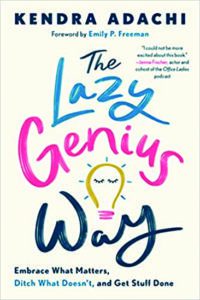The Lazy Genius Way: Embrace What Matters, Ditch What Doesn’t, and Get Stuff Done
Kendra Adachi
Waterbrook, 240 pages
I picked up The Lazy Genius Way in the midst of a personally chaotic season. We had just had our third child, and we’d moved to a brand-new city in the U.S. after living for ten years in Central America—all in the midst of Covid-19. This book turned out to be just what I needed.

In these pages Kendra Adachi invites women to identify what matters most in life and focus on the essentials. (Early on, she addresses a note to male readers: “If you’re a dude, please let this inform your understanding of how women are often wired and the pressures we feel due to the culture we’re part of. Also, thank you for reading this book, even though I will unashamedly always use female pronouns.”) Adachi, who hosts a podcast with the same title, identifies 13 life principles to help readers to name their true values and then make changes in how they go about focusing on them.
Adachi draws her readers in from the first pages when she names the overwhelming fatigue and guilt we experience when we compare ourselves to others. Her tone is inviting in a relatable, chat-on-the-porch-with-a-neighbor way. She gently reminds us that we are not alone, especially in this uncertain and isolating time. And she frees us to reset and prioritize well by focusing on what really matters to us—to be “lazy about what does not matter and a genius about what does.”
Addressing our chronic exhaustion, she writes, “We need to stop trying to out-real each other. That life is why you and I are tired and we can let it go. So the next time you find yourself looking for flaws in seemingly perfect people, hoping it will make you feel better, don’t. Telling yourself you’re better than someone is just as harmful as telling yourself you’re worse.”
Each of us needs to relieve our pressure and self-imposed stress but allow ourselves to live and reveal our whole selves—both the chaos and the order. In the midst of our life transitions this year, I have often felt less than put together. But Adachi encourages me: “You can be real when life is in order AND when it’s falling apart. Life is beautifully both.”
What I appreciated most was Adachi’s invitation to rediscover my unique identity and reevaluate what matters most. “You are not a blueprint seeking completion,” she writes. “You’re a sacred soul created by the God of the universe. Love who you are now.”













